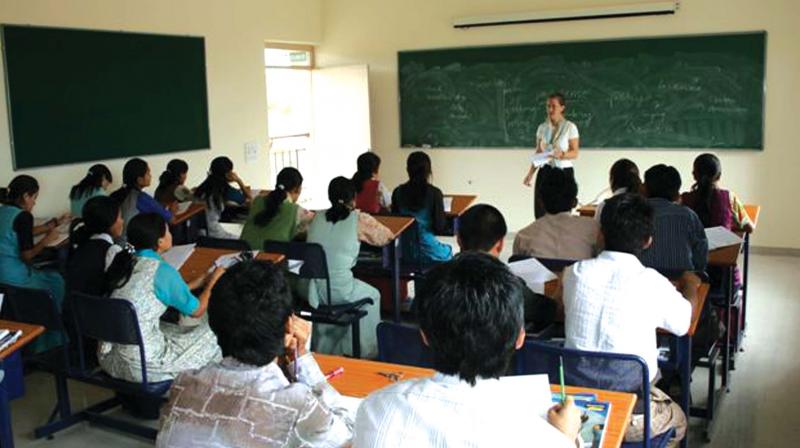DC Impact: Kerala government to step in, solve guest lecture woes
Director of Collegiate Education asked to evolve a formula in consultation with college principals.

Kochi: The department of higher education has asked the director of collegiate education (DCE) to hold talks with college principals in the state and make appropriate recommendations to the government to improve the working conditions, including pay, of guest lecturers in the state. It will also seek an end to the delayed payments to them.
“It’s for the DCE to discuss the issue with principals and make appropriate recommendations to the secretary and the government,” higher education secretary Usha Titus told DC.
“The guest lecturers are paid on an hourly basis and this results in low pay. I understand that the guest lecturers in the higher secondary school sector are better off and the issue can be solved if the pattern is followed in the case of those in the colleges as well.”
The DCE needs to evolve a formula in consultation with the principals and put before the government, she said.
Dr Titus was responding to queries based on a report in these columns on the pathetic working conditions of guest lecturers.
Junior guest lecturers in higher secondary schools are paid Rs 1,130 and seniors Rs 1,300 a day,” a higher secondary teacher told DC. “The principals and teachers arrange the classes through mutual consultations.”
Dr Titus said the DCE should settle the issue of delayed payments to the guest lecturers as well. “The DCE has to solve this, too, and I will discuss the issue with him and find a solution,” Dr Titus said.
Guest lecturers with post-graduate degrees get Rs 300 per hour and those with NET qualification get Rs 500 in aided colleges.
They complain that they get monthly payments in the range of Rs 20,000 and Rs 25,000 only in two months - October and January as they have higher number of teaching hours while they get a substantially low pay in the other months.
Many self-financing colleges are paying the guest lecturers in the range of Rs 7,000 and Rs 15,000.
Stop the blame game
Apropos the write-up titled “An Unwelcome Guest” dated October 30, 2017:
I wish to state that the treatment meted out to guest lecturers in various institutions is nothing short of mindless callousness. The step-motherly attitude shown to the hapless teachers is something that is unbecoming of the department of higher education. The guest lecturer is no different from a scapegoat: victimised, albeit inadvertently by the government, the institutions, the management, the colleagues and the administrative staff of the colleges concerned. The governments and the UGC seem to have drafted some guidelines for such appointments which turn out to be a colossal disappointment for the candidates selected. The so-called guidelines unfortunately are often subjected to various levels of misinterpretations and ambiguities which are conflicting. As a very clear cut directive has so far not been introduced, the authorities who handle the appointment procedures and payment modalities of the selected guest lecturer are “justified” to deal with these files in a lackadaisical manner. This makes matters worse for the guest lecturer who has to slog hard to discharge the duties of a regular lecturer/assistant professor without receiving salary for months and sometimes for no less than two years. The victims are mostly passionate teachers who have demonstrable academic interest and talent but not hailing from affluent families. It is here that the word exploitation matches the predicament of the guest lecturer. Going through the harrowing experiences of the teachers referred to in the write-up that came in Deccan Chronicle, it looks like a perfectly crafted blame-game where no one is held responsible.
Dr G. Rangarajan,
Associate professor and former head of the department of English, Maharaja’s College, Ernakukam
Victims of execrable red-tapism
I appreciate your attempts to bring to public notice the deplorable issue of the non-payment of salaries due to FIP substitutes who had worked at various colleges across the state.
Most of these qualified and diligent youngsters put in their best efforts to serve the institutions they are employed in replacing regular faculty members pursuing research; yet more often than not they remain largely unpaid long after the completion of their tenure.
This delay in remunerating them for the work done causes a lot of distress to the temporary hands who always prove to be vital for the smooth conduct of classes at various government and aided colleges.
At times their dues are paid years after the end of their service due to the execrable red-tapism that blots the operations of our bureaucracy.
One hopes your report goes some way in mitigating their woes. Gangesh Vadakkeyil gangeshbv@live.com

